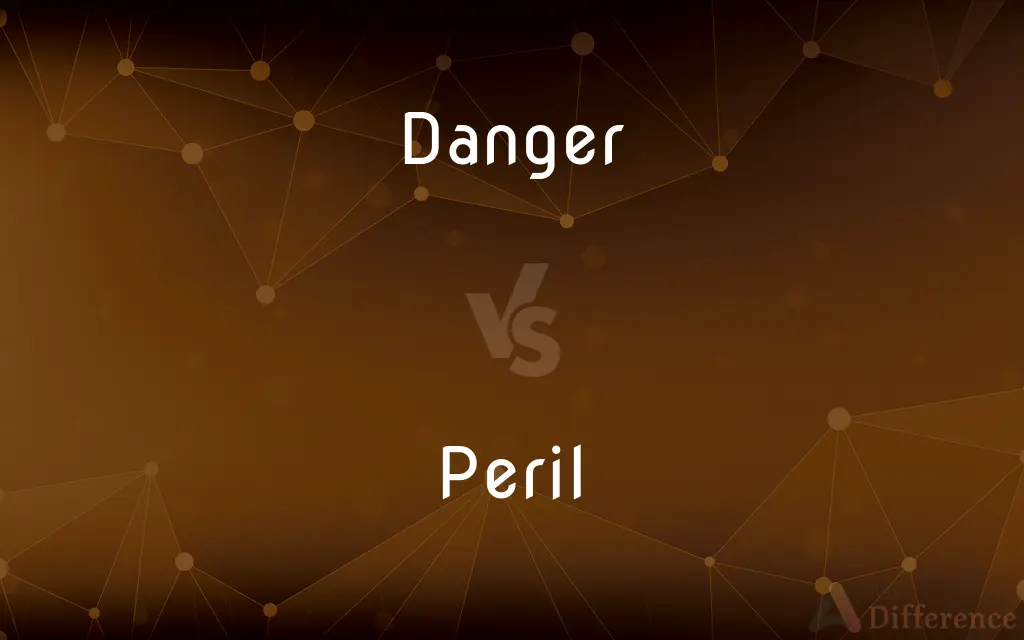Danger vs. Peril — What's the Difference?
By Fiza Rafique & Urooj Arif — Updated on March 15, 2024
Danger is a broad term for potential harm or injury, while peril specifically refers to immediate and serious threat to safety.

Difference Between Danger and Peril
Table of Contents
ADVERTISEMENT
Key Differences
Danger encompasses a wide range of potential threats that can lead to harm or adverse outcomes, including situations that might not be immediately life-threatening. Peril, on the other hand, implies a more immediate and severe threat that often demands urgent attention to avoid catastrophic results.
While danger can be present in various degrees of intensity and may allow for some level of risk management or avoidance strategies, peril suggests a scenario where the stakes are significantly higher, and the margin for error is minimal. This distinction highlights the immediacy and severity associated with peril compared to the broader, sometimes less immediate implications of danger.
In terms of perception and response, danger may evoke caution and preventive measures, encouraging individuals to be aware of potential risks and to act accordingly to mitigate them. Conversely, the presence of peril typically triggers immediate action or emergency responses to safeguard life and property, underlining the critical nature of the threat.
The terminology is also reflective of the context in which it is used; "danger" is a term commonly used in everyday situations and safety warnings, ranging from mild to severe risks. "Peril," however, is often used in more formal or specific contexts, such as insurance policies, where it denotes risks that are covered due to their potentially devastating impact.
Despite their differences, both danger and peril serve as important signals for awareness and preparedness. Recognizing the presence of danger or peril is crucial in taking appropriate actions to protect oneself and others from harm.
ADVERTISEMENT
Comparison Chart
Definition
A broad term indicating potential harm or adverse outcomes.
A specific term indicating an immediate and serious threat.
Intensity
Can vary from mild to severe.
Typically denotes a high level of severity.
Response
May evoke caution and preventive measures.
Triggers immediate action or emergency responses.
Usage Context
Common in everyday situations and safety warnings.
Often used in formal contexts, such as insurance policies.
Immediacy
Potential threats may not be immediately life-threatening.
Implies immediate danger to life or property.
Compare with Definitions
Danger
A possibility of suffering harm or injury.
Walking alone at night in an unfamiliar area poses a danger.
Peril
Serious and immediate danger.
The sailors faced the peril of a storm at sea.
Danger
A person or thing likely to cause harm.
Ice on the roads is a significant danger to drivers.
Peril
The exposure to significant risk.
Climbing without proper equipment puts you in peril.
Danger
The state of being exposed to risk.
The hikers were in danger of getting lost without a map.
Peril
The jeopardy of life, limb, or property.
Firefighters often work in peril to save others.
Danger
The likelihood of something unwelcome happening.
There's a danger of the river flooding with the heavy rains.
Peril
A cause of injury, loss, or destruction.
Smoking is a peril to your health.
Danger
A situation involving exposure to harm.
Hazardous chemicals present a danger to health.
Peril
A situation of grave risk.
They rescued the trapped miners from peril.
Danger
The possibility of suffering harm or injury
His life was in danger
Peril
Imminent danger
A sign warning of the peril of falling rocks.
Danger
Exposure or vulnerability to harm or risk.
Peril
Exposure to the risk of harm or loss
In peril of losing his savings.
Danger
A source or an instance of risk or peril.
Peril
Something that endangers or involves risk
Couldn't avoid the perils of the desert.
Danger
(Obsolete) Power, especially power to harm.
Peril
To expose to danger or the chance of injury; imperil.
Danger
Exposure to likely harm; peril.
There's plenty of danger in the desert.
Peril
A situation of serious and immediate danger.
Your life is in peril.
Danger
An instance or cause of likely harm.
Peril
Something that causes, contains, or presents danger.
The perils of the jungle (animals and insects, weather, etc.)
Danger
(obsolete) Mischief.
Peril
(insurance) An event which causes a loss, or the risk of a specific such event.
Danger
The stop indication of a signal (usually in the phrase "at danger").
The north signal was at danger because of the rockslide.
Peril
(transitive) To cause to be in danger; to imperil; to risk.
Danger
(obsolete) Ability to harm; someone's dominion or power to harm or penalise. See in one's danger, below.
Peril
Danger; risk; hazard; jeopardy; exposure of person or property to injury, loss, or destruction.
In perils of waters, in perils of robbers.
Adventure hardWith peril great achieved.
Danger
(obsolete) Liability.
Peril
To expose to danger; to hazard; to risk; as, to peril one's life.
Danger
(obsolete) Difficulty; sparingness; hesitation.
Peril
To be in danger.
Danger
(obsolete) To claim liability.
Peril
A source of danger; a possibility of incurring loss or misfortune;
Drinking alcohol is a health hazard
Danger
(obsolete) To imperil; to endanger.
Peril
A state of danger involving risk
Danger
(obsolete) To run the risk.
Peril
A venture undertaken without regard to possible loss or injury;
He saw the rewards but not the risks of crime
There was a danger he would do the wrong thing
Danger
Authority; jurisdiction; control.
In dangerhad he . . . the young girls.
Peril
Pose a threat to; present a danger to;
The pollution is endangering the crops
Danger
Power to harm; subjection or liability to penalty.
You stand within his danger, do you not?
Covetousness of gains hath brought [them] in dangerof this statute.
Peril
Put in a dangerous, disadvantageous, or difficult position
Danger
Exposure to injury, loss, pain, or other evil; peril; risk; insecurity.
Danger
Difficulty; sparingness.
Danger
Coyness; disdainful behavior.
Those rich man in whose debt and danger they be not.
Danger
To endanger.
Danger
The condition of being susceptible to harm or injury;
You are in no danger
There was widespread danger of disease
Danger
A venture undertaken without regard to possible loss or injury;
He saw the rewards but not the risks of crime
There was a danger he would do the wrong thing
Danger
A cause of pain or injury or loss;
He feared the dangers of traveling by air
Danger
A dangerous place;
He moved out of danger
Common Curiosities
Can a situation be dangerous without being perilous?
Yes, a situation can be considered dangerous without being perilous if the threat is not immediate or particularly severe.
What types of responses do danger and peril evoke?
Danger may prompt caution and preventive measures, whereas peril typically triggers immediate action or emergency responses.
What is danger?
Danger refers to the possibility or condition of suffering harm or injury, which can vary in severity.
How do danger and peril differ in terms of severity?
While danger can range from mild to severe, peril specifically implies a high level of severity and immediate threat.
Why is it important to distinguish between danger and peril?
Distinguishing between danger and peril helps in assessing the severity of a threat and determining the appropriate level of response.
What does peril mean?
Peril denotes serious and immediate danger, often requiring urgent action to avoid disastrous consequences.
Is the perception of danger and peril subjective?
Yes, perception of danger and peril can be subjective, depending on an individual's experience, knowledge, and risk tolerance.
How are danger and peril used in insurance policies?
In insurance policies, peril refers to specific risks covered, emphasizing the immediate and serious nature of these threats.
Can preventive measures reduce peril?
While preventive measures can mitigate danger, peril often requires immediate action to avert or minimize its impact.
Can technology help in predicting danger and peril?
Yes, technology can help in predicting danger and peril, allowing for earlier warnings and potentially reducing the risks associated.
What role does awareness play in responding to danger and peril?
Awareness is crucial in recognizing the presence of danger or peril, enabling timely and effective responses to protect oneself and others.
How do emergency services respond to danger and peril?
Emergency services respond to danger with caution and readiness, while peril demands immediate and decisive action to prevent harm.
What is the psychological impact of living under constant danger or peril?
Constant exposure to danger or peril can lead to stress, anxiety, and other psychological impacts, highlighting the importance of effective risk management.
What is the significance of communication in managing danger and peril?
Effective communication is key in managing danger and peril, ensuring timely dissemination of information and coordination of responses.
How do education and training prepare individuals for danger and peril?
Education and training improve preparedness and resilience, enabling individuals to better respond to danger and navigate perilous situations.
Share Your Discovery

Previous Comparison
Divider vs. Divisor
Next Comparison
Correct vs. ProperAuthor Spotlight
Written by
Fiza RafiqueFiza Rafique is a skilled content writer at AskDifference.com, where she meticulously refines and enhances written pieces. Drawing from her vast editorial expertise, Fiza ensures clarity, accuracy, and precision in every article. Passionate about language, she continually seeks to elevate the quality of content for readers worldwide.
Co-written by
Urooj ArifUrooj is a skilled content writer at Ask Difference, known for her exceptional ability to simplify complex topics into engaging and informative content. With a passion for research and a flair for clear, concise writing, she consistently delivers articles that resonate with our diverse audience.













































